Conspiracy: Take the Crown Mechanics
Conspiracy: Take the Crown takes us back to Paliano and features all the intrigue, backstabbing, and machinations you can handle. It's everything you loved about the original Conspiracy and so much more. Find some co-conspirators and bundle up, 'cause it's about to get quite drafty. Let's take a look at some exciting new cards that show off the new mechanics you'll encounter while fighting for the throne.
Conspiracy Draft
Conspiracy: Take the Crown is designed to be played in the format it takes its name from: Conspiracy Draft. Conspiracy Draft starts with, predictably, a booster draft. Each player sits around the table in a random order with three booster packs. Packs are opened and cards are drafted into your card pool one at a time. If you've never drafted before, check out more info here.
Then, players break off into free-for-all multiplayer games. Seating for the games is also random. It doesn't matter where you sat during the draft. You can (and should) attack multiple opponents or opposing planeswalkers during combat. Everyone starts at 20 life, and it's total war until one player is left standing. Then that player can sit down on the throne, at least until the next game starts.
A Conspiracy draft works well with eight players, but it's fun no matter how many players want in. We recommend having no more than eight players per draft and then splitting up into games of three to five players.
Draft Abilities
If you're going to contend for the throne, you'll need an army, and the draft provides you with just that army. What really sets Conspiracy sets apart are the cards that have effects while the draft is happening.
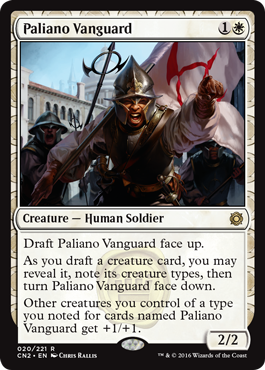
Each player should bring paper and pen (or quill, for you cosplayers out there), because you're going to want to take notes. Some cards, like the pictured Paliano Vanguard, instruct you to note information that will come into play during the game. This information can be anything: names of cards, creature types, and so on. Note that cards with the same name are interchangeable. For example, say you draft Paliano Vanguard and note Human Soldier (fairly likely). Then you draft another one and note Eldrazi Fish (less likely). During the game, either Paliano Vanguard will give a bonus to any Human, Soldier, Eldrazi, or Fish you control. In fact, you could even gain control of another player's Paliano Vanguard, and it would still give a bonus to those creatures.
Other cards may affect how you draft cards or affect the draft in other delightful, unusual ways. If a card tells you to draft it face up, place it face up in front of you instead of putting face down in your drafted cards pile. While that card is face up, its abilities that pertain to the draft will work. If you can turn it face down for an effect during the draft, the card will let you know. If a card tells you to reveal a card as you draft it, show it to the other players, follow whatever instructions it has for you, then put it face down into your drafted cards pile.
A lot can happen during a Conspiracy draft, so make sure the players in your draft communicate with each other, especially when draft abilities are happening. You shouldn't let booster packs "pile up" behind any player. If the person you're passing to during the draft is still looking at a booster pack, just wait patiently. You'll get to smash them soon enough.
Conspiracies
Conspiracy is a card type introduced in a previous expansion. I forget the name. But they are great. Conspiracies start the game in the command zone. From there, they affect the game in (stop me if you've heard this before) delightful, unusual ways.
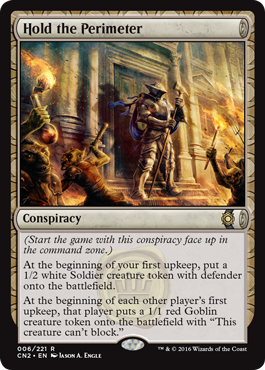
Conspiracies aren't put into your deck, so they don't count toward the 40-card minimum. You just put them into the command zone before the game begins. Hold the Perimeter gets the action started quickly and leaves you well-protected. Not every conspiracy starts face up, though. Some rely on a little mystery.
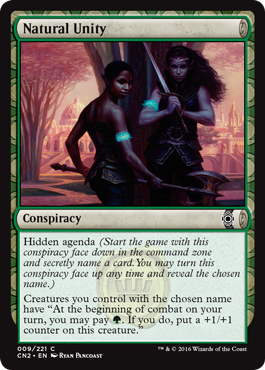
Conspiracies with hidden agenda have you secretly name a card before the game begins. Perhaps the easiest way to do this is write the name on a piece of paper and keep it with the face-down conspiracy. Hopefully, you can name a card you've drafted multiples of. Any time you have priority during the game, you can turn the conspiracy face up and reveal the chosen name and what bonus the conspiracy provides. Several conspiracies, including Natural Unity, have color-aligned abilities that not every deck will be able to take advantage of. It should make the draft very interesting.
Naming one card not enough for you? Well, one card has a variant you may enjoy: double agenda.
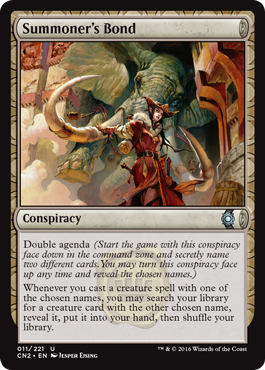
Note that conspiracies aren't legal in Constructed formats, but they're perfect for crafted Limited formats such as Cube.
The Monarch
Heavy is the head that wears the crown. Heavy with awesome power and lavish tribute, that is! The monarch is a new concept for Magic: a designation that a player may have during the game. The game starts with no monarch. There are three ways a player becomes the monarch. The most direct way is cards like Knights of the Black Rose.
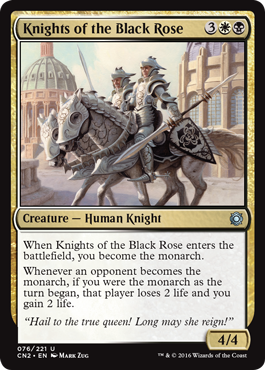
The second way to become the monarch is to attack the existing monarch. If a creature you control deals combat damage to the monarch, you become the monarch. But as Marchesa says, "You come at the queen, you best not miss."
The third way to become the monarch is if the current monarch leaves the game. When that happens, the player whose turn it is becomes the monarch. If the monarch leaves the game on their turn, the next player in turn order becomes the monarch.
Once a player is made the monarch, there will be exactly one monarch for the rest of the game. As one player becomes the monarch, the existing monarch (if there is one) stops being the monarch.
Why do you want to be the monarch? There are two significant bonuses to holding the position: First, at the beginning of the monarch's end step, that player draws a card. That's a considerable advantage. Second, several cards in the set get better if you're the monarch.
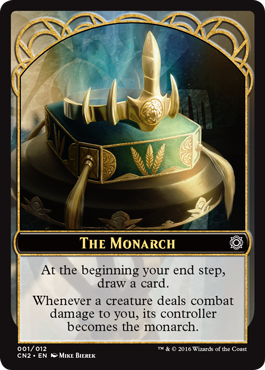
Council's Dilemma
The enigmatic council of Paliano returns in this set, their many fingers in every pie imaginable. Voting was a popular mechanic in the first Conspiracy set, and it returns on new council's dilemma cards. Here's Lieutenants of the Guard.
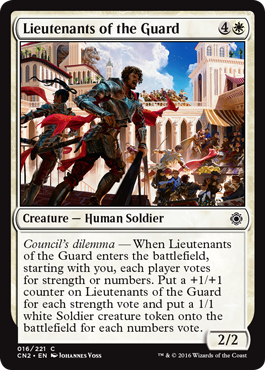
With council's dilemma cards, every vote will add to the overall effect. These cards especially shine in larger games. The more opponents you have, the more votes there are. Of course, even though both options are good for you, you may have a preference. Well, do I have the card for you.
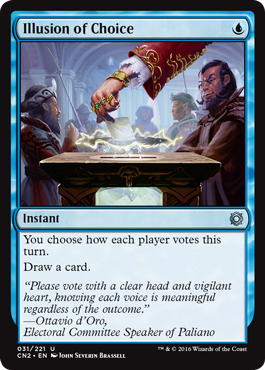
Council's dilemma cards all follow the same basic pattern: First, starting with you, everyone votes. Players will know the votes of previous players before voting themselves. Then, you carry out the first effect, followed by the second effect. Once the council's dilemma spell or ability starts resolving, no one has priority, so you can't interrupt the vote or any of the resulting effects.
Of course, you can respond with spells and abilities before the council's dilemma spell or ability starts resolving, which brings up one situation you should be aware of. Say you cast Lieutenants of the Guard. It enters the battlefield, and its council's dilemma ability triggers. In response, one of your dastardly opponents takes the Lieutenants out. Curses! Your opponents will still be able to vote for strength, even though you can't put +1/+1 counters on the Lieutenants, as they're dead.
Goad
You want some? Come get some. Goad is a new ability that forces creatures to attack. More specifically, it forces creatures to attack someone other than you.
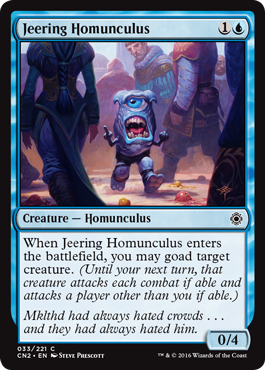
A goaded creature has to attack a player other than you if it can. And that means a player, not a planeswalker. The controller of a goaded creature still chooses who the creature attacks. As usual with effects that force a creature to attack if able, it has to actually be able. If it's tapped, then it can't attack. If there's a cost to attack, its controller doesn't have to pay that cost, and if he or she doesn't, the creature doesn't have to attack. Goading a creature with defender won't do much, no matter how pointy your finger is.
If the creature can't attack a player other than you, then it must attack you or a planeswalker if it can. This is most likely when the game is down to two players. And keep in mind that a goaded creature remains goaded until your next turn. So if another player gains control of it before then, it attacks under the same conditions if able.
Melee
The other players in the game could be trusted friends and advisors on your path to ascension. Nah...attack 'em all. Melee is a new ability that triggers whenever the creature with it attacks. It gets +1/+1 until end of turn for each opponent you attacked that combat.
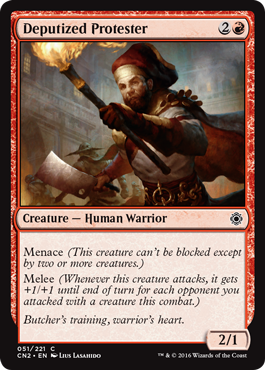
It doesn't matter how many creatures attack any particular player. So, if you're in a five-player game and you attack one opponent with three creatures and another opponent with one creature with melee, the last creature will get +2/+2 until end of turn. Melee will trigger if a creature attacks a planeswalker, but only opponents you attack will count toward the bonus. So spread the love.
Game On
And those are the mechanics of Conspiracy: Take the Crown. You now know everything you need to know to, as the name of the set suggests, take the crown. Find some competition, grab your seat at the table, and good luck.

